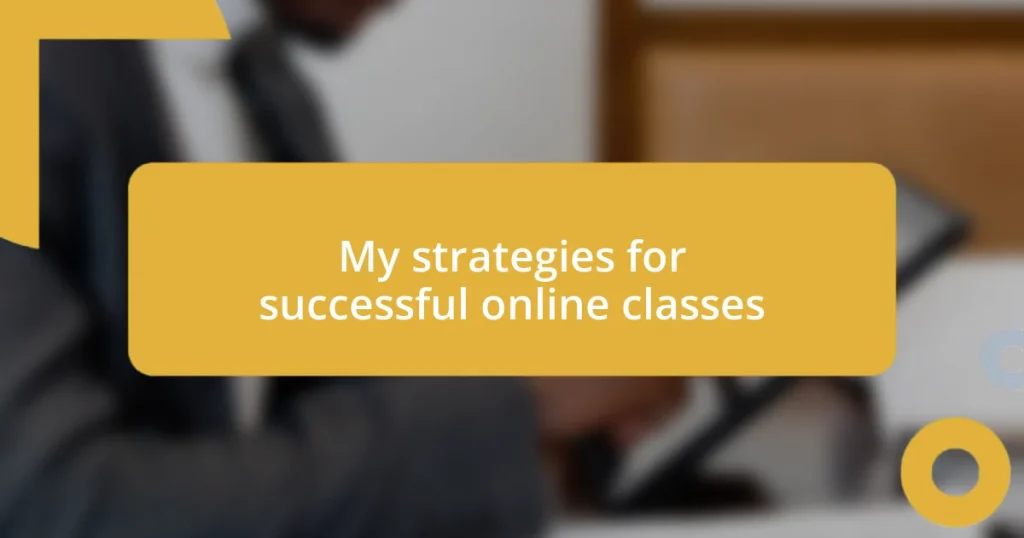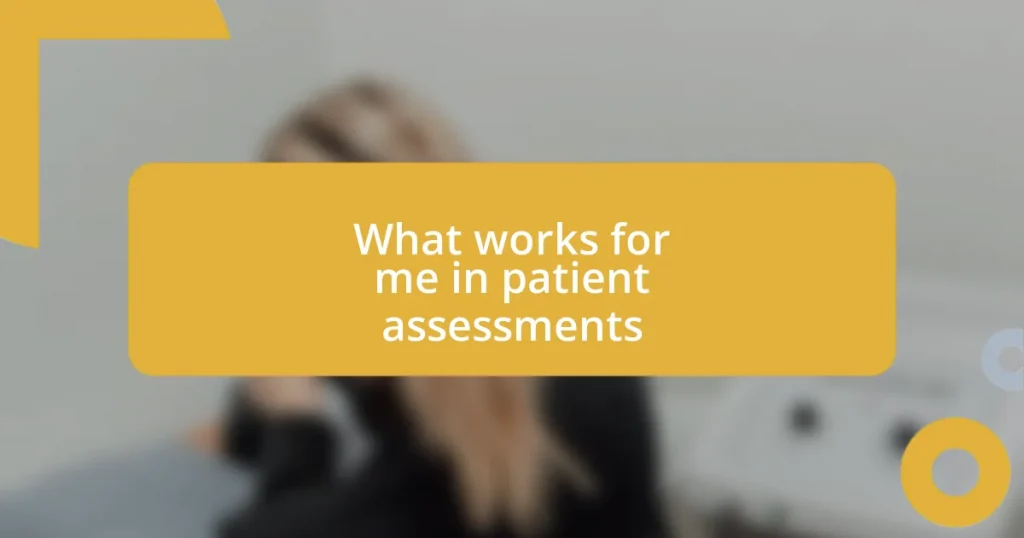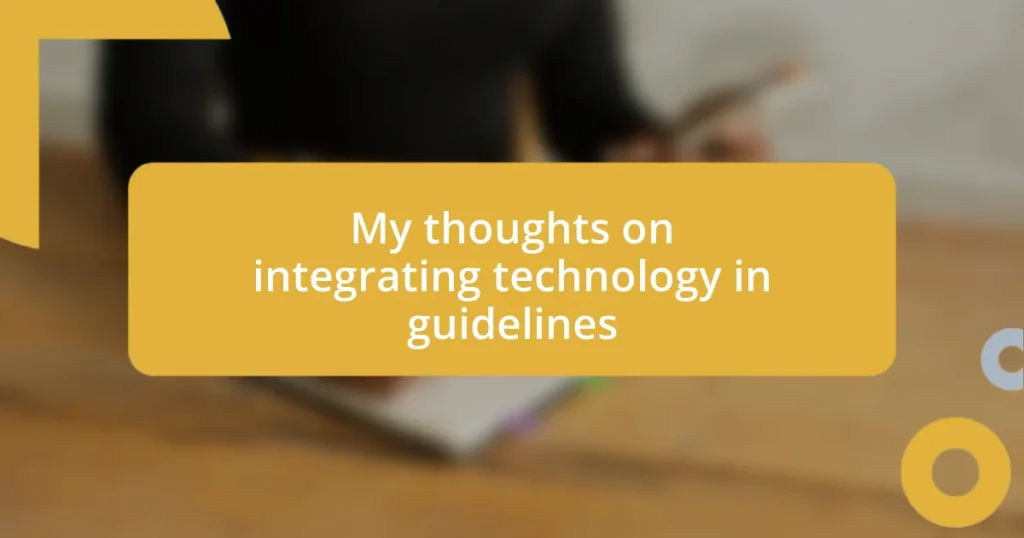Key takeaways:
- Identifying your learning style (visual, auditory, kinesthetic) can enhance comprehension and engagement in online classes.
- Setting realistic, SMART goals and creating a dedicated study space are crucial for effective time management and motivation.
- Actively seeking feedback from peers and instructors, along with utilizing technology, can significantly improve the online learning experience.

Understand your learning style
Understanding your learning style can be a game-changer in your online education journey. I remember when I first started taking online courses; I struggled to keep up with the lectures. It wasn’t until I realized that I’m a visual learner that everything clicked. Once I began using diagrams and mind maps, I felt my comprehension soar.
What about you? Have you ever noticed certain methods resonate with you more than others? Some people might absorb information best through listening, while others thrive on hands-on practice. This realization can save you time and frustration, as you’ll be able to tailor your study techniques to what feels natural for you.
For instance, I know that writing things down helps me remember, so I often create summaries in my own words after watching a video lecture. The emotional boost I get from seeing my notes come together is incredible. When I shifted my focus to my learning style, I not only became more engaged but also started enjoying the process of learning itself. It’s truly empowering to create a study environment that works for you.

Set realistic goals
Setting realistic goals is crucial for maintaining motivation in online classes. I’ve had my fair share of lofty ambitions that quickly dimmed into frustration. For example, during one semester, I aimed to complete a textbook in a week. The pressure was overwhelming, and I ended up only skimming the surface. It taught me that achievable goals are far more satisfying than setting myself up for disappointment.
Here are some strategies for setting goals that resonate with your personal capabilities:
- Break larger tasks into smaller, manageable pieces.
- Set specific, measurable, attainable, relevant, and time-bound (SMART) objectives.
- Focus on daily or weekly goals rather than long-term ambitions.
- Reflect on past achievements to guide your current goals.
- Adjust your goals as needed to account for unforeseen challenges.
By prioritizing realistic goals, you’ll find that your journey through online classes can be both manageable and rewarding.

Create a dedicated study space
Creating a dedicated study space is essential for anyone diving into online classes. I learned this the hard way when I attempted to study on my crowded dining table, filled with distractions and the constant pull to grab a snack. After weeks of struggling, I decided to reclaim a quiet corner of my room. This space, free from clutter and chaos, became my personal sanctuary for learning. It’s amazing how just having a designated area can mentally shift my mindset to be more focused and productive.
When designing your study nook, think about the elements that work best for you. For me, good lighting is a game-changer; I always feel more energized and alert when I can see my materials clearly. Additionally, I surround myself with items that inspire me—a few motivational quotes and a plant that I care for, which adds a touch of life to my space. What do you think makes a study area appealing? Perhaps it’s a comfy chair or your favorite color on the walls.
I often find that those little personal touches not only create an inviting environment but also foster a sense of belonging and comfort. Our study spaces should reflect who we are. It’s about creating a space that feels like ours, guiding us toward success in our online educational endeavors. The difference it makes is profound—I can truly say that a well-thought-out study space has completely transformed my learning experience.
| Study Space Essentials | |
|---|---|
| Factors to Consider | My Experience |
| Lighting | Good lighting keeps me alert and focused. |
| Comfortable Seating | A supportive chair boosts my productivity. |
| Inspirational Decor | Personal touches help me stay motivated. |
| Minimized Distractions | A quiet corner allows for deeper concentration. |

Use effective time management
Use effective time management
Time management is a game-changer for online classes. I remember feeling overwhelmed by assignments when I didn’t track my study hours. It hit me one evening when I spent three hours on a task that should have only taken one—talk about inefficient! I realized that using a planner or a digital calendar could help me visualize my commitments, which was like finding a map in a maze.
It’s crucial to prioritize tasks based on deadlines and importance. I often jot down a to-do list each morning, ranking tasks by urgency. This practice not only keeps me organized but also gives me a sense of accomplishment as I cross items off. Have you tried this method? It’s quite rewarding to see your productivity unfold visually.
I also find setting time limits for tasks incredibly effective. When I allocate, say, 25 minutes to focus solely on studying, I am more likely to stay concentrated and then reward myself with a short break. This technique, often referred to as the Pomodoro Technique, has been a lifesaver during particularly busy weeks. By managing my time wisely, I’ve learned to turn what once felt like chaos into a structured routine that fuels my success.

Engage with classmates actively
Engaging with classmates actively can significantly enhance your online learning experience. I remember joining my very first online discussion forum; I was hesitant to share my thoughts at first. But once I took that leap and started commenting on others’ posts, it felt like a weight lifted. The instant feedback and interaction made the material come alive in ways I hadn’t anticipated.
One strategy I’ve found immensely helpful is forming study groups. I reached out to a couple of classmates after realizing how much I struggled with certain concepts. Let me tell you, meeting virtually to discuss course material turned those seemingly daunting topics into exciting challenges. Sharing insights and hearing different perspectives truly deepened my understanding and made the entire experience more enjoyable. Have you considered starting a group or even joining one?
Moreover, participating in live discussions or Q&A sessions can be a game-changer. I recall during a particularly challenging class, our instructor set up a live feedback session. I took my notebook, prepared questions, and engaged with my peers in real-time. That interaction not only clarified my doubts but also fostered a sense of community. It’s amazing how being active in an online environment can turn isolation into connection. Are you ready to engage? Trust me; it’s worth stepping out of that comfort zone!

Utilize technology for learning
Utilizing technology effectively can transform your online learning experience. I remember the first time I used an app to organize my notes; it was a game changer. Suddenly, all my thoughts were neatly categorized, and I could easily retrieve information during study sessions. Have you ever tried digital note-taking? It feels like a breath of fresh air when everything is at your fingertips.
Another tech tool that I swear by is online collaboration platforms, such as Google Docs. I often team up with classmates to work on projects, and being able to see real-time edits and comments is invaluable. It not only streamlines the group work process but also encourages spontaneous brainstorming. Have you found ways to collaborate that make learning more dynamic?
Virtual resources like educational podcasts and online lectures have also become staples in my study routine. I can’t count how many times I’ve listened to a podcast while jogging or doing house chores, making learning a seamless part of my day. It’s fascinating how technology enables learning to happen anytime, anywhere. Have you tapped into this resourceful avenue? It can really make a difference in understanding complex subjects!

Seek feedback and improve
Seeking feedback is one of the most powerful steps toward improvement in online classes. I remember submitting my first major assignment, feeling proud of my work. When I received my instructor’s comments, I felt a mix of anxiety and excitement. Those constructive critiques not only highlighted my strengths but also pinpointed areas for growth. How often do you ask for feedback, and how do you respond to it? Embracing feedback has consistently helped me refine my skills.
After some project presentations, I started engaging in peer reviews, and the insights I gained have been invaluable. Listening to my classmates’ perspectives opened my eyes to different ways of thinking. Their feedback often made me rethink my approach, which was refreshing. It taught me that improvement is a team effort; we all have unique insights to offer one another. Have you thought about how feedback could shape your learning journey too?
Sometimes, the best feedback can come from self-reflection. After completing a course, I take time to jot down what worked for me and what didn’t. This practice has been a game-changer in my online learning experience. Recognizing patterns in my behavior has helped me develop better study strategies for future classes. Have you tried reflecting on your own learning process? You’d be amazed at the clarity it can bring.















